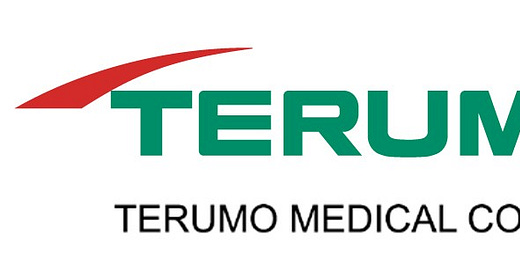FDA Finds Japanese Medical Device Manufacturer Allows Defective Devices to Enter The World-Wide Marketplace Through Inadequate Quality Control
Terumo Angio-Seals, Used to Close Artery Openings After Medical Procedures, Allowed Into Marketplace Even When Defective Due to Inadequate Quality Control, According to FDA.
Terumo Medical Corporation, a Japanese company with U.S. and world-wide subsidiaries, acquired the Angio-Seal business of St. Jude Medical in 2016 as part of the acquisition of St. Jude by Abbott. The Justice Dept. Anti-Trust Division required St. Jude to sell the Angio-Seal business as a condition for the Abbott purchase of St. Jude. Did that sale help consumers? A recent FDA Report suggests otherwise.
What are Angio-Seals? They are Type III Medical Devices inserted by doctors into a hole they punctured in an artery as to deliver part of a medical procedure. The Angio-Seal is placed into the hole in the artery at the end of the procedure to plug the hole and prevent the artery from leaking blood into the body through internal bleeding. The Angio-Seal is designed to dissolve inside the patient’s body in ninety days, so it does not require surgical removal.
Angio-Seals are used in a wide variety of medical procedures including heart valve replacements and repairs. A TAVR is a typical and oft-repeated procedure where an artery has been opened to allow a catheter holding a replacement heart valve to be guided through the artery into the heart. So the artery gives the surgeon access to the heart to properly place the replacement heart valve. In some TAVR procedures a second artery is punctured so that dye can be inserted in order to assist in the careful positioning of the new heart valve inside the patient’s heart. That second artery opening also has to be closed with an Angio-Seal. As these are very delicate medical procedures, it is important that the Angio-Seal works properly.
FDA grants approvals for medical devices after a rigorous application and review process. Type III medical devices get the highest and most careful FDA examination to assure the public that FDA will only approve a potentially dangerous medical device if they are convinced of the safety and efficacy of the device. If the device meets FDA requirements for design and the manufacturing process is approved, FDA will issue a Premarket Approval (”PMA”) allowing the manufacturer to begin manufacturing the device and distributing it to doctors and hospitals for use in medical procedures. FDA issued a PMA for the Terumo Angio-Seal in 1996. Terumo had been manufacturing Angio-Seals before the St. Jude acquisition.
According to an FDA, August, 2022 facility inspection report, Terumo manufactures its Angio-Seals in a facility located in Cayugas, Puerto Rico, and in fact this Puerto Rican facility is the sole world-wide facility for manufacturing Terumo Angio-Seals. This FDA facility inspection report was the first inspection of the Terumo Puerto Rican facility since Terumo’s acquisition of the St. Jude Angio-Seal business.
So, according to FDA, how is Terumo doing in making sure its manufacturing process meets the FDA approved design and quality control for the Terumo Angio-Seal? FDA did not conduct an intensive exam to see if the manufacturing processes deviated from the approved design. They focused on whether required processes and FDA standards were followed. FDA did not provide assurance that all Angio-Seals manufactured there met the FDA approved design requirements included in the PMA.
In a striking and very important finding, FDA found that Terumo’s Quality Control systems had a major defect. According to FDA the Terumo personnel assigned to Quality Control only segregated Angio-Seals that were found to be defective or non-conforming “when practical.” In other words, FDA found that Terumo allowed defective and non-conforming Angio-Seals to enter the marketplace if it was not practical to segregate a non-conforming Angio-Seal when identified by Terumo Quality Control personnel. These defective and non-conforming Angio-Seals were then sold and distributed by Terumo to doctors and hospitals around the world.
The FDA Inspector stated a major finding on page 10 of the Report: “Products that do not conform to specifications are not adequately controlled.”
The FDA Inspector quoted from the Terumo “Procedure Control of Non-Conforming Product, Document ID: TPR-SOP-90258086, section 7.2.3.1.2. The material must be removed from regular production or warehouse areas and located in the QC Cage (whenever is practical). However, specific instructions on what is practical or when is practical to segregate and quarantine non-conforming products are not established within your procedure to prevent mix-up and use of the non-conforming product.” FDA Report, page 10.
The FDA Inspector stated that the lack of clarity in Terumo instructions and the failure to define what was meant by segregating non-conforming product “whenever is practical” allowed non-conforming Angio-Seals to be marketed and used by doctors and hospitals.
The FDA Inspector then stated that “procedures for corrective and preventive action have not been adequately established. Specifically, the effectiveness of Preventive measures is not conducted per your procedure. However, the effectiveness evaluation must be undertaken to ensure that the actions effectively address the quality signals that initially drove the action.” FDA Report pages 10-11.
The FDA inspector then noted that the Terumo Operations Director and the Terumo Senior VP Quality and Regulatory Affairs “concurred with the discussed items and promised to initiate voluntary corrections.” FDA Report, page 11.
The FDA Inspector stated that she verbally discussed with Terumo management her findings that “The control of the non-conforming process for (a) not establishing an adequate timeframe for physical removal of the non-conforming products.”
The FDA negative findings on lack of adequate Quality Control was discussed with Terumo management and included in the written report. FDA felt this Quality Control issue was very serious as it could lead to distribution of non-conforming Angio-Seals.
A defective Angio-Seal can have serious, negative results for the patient including death and serious injury. Whenever a death or serious injury results from a defective Angio-Seal, the doctors and hospitals are required to file a report of the death or serious injury with FDA, and then FDA includes those reports in its MAUDE database.
The author has experience with a defective Angio-Seal resulting from Terumo’s gross negligence in allowing defective and non-conforming Angio-Seals to enter the marketplace. He had a TAVR operation in December, 2021, and a day later and about one hour after hospital discharge, he got up from a chair and his Angio-Seal totally failed, causing massive internal bleeding and swelling of the groin and thigh to three times normal size. He was rushed by ambulance back to the hospital where a total of five operations were performed, over two weeks, with general anesthesia and eight blood transfusions to clean and repair the damage done by the defective Angio-Seal.
Review of the MAUDE database shows that there were about fifty reports of death or serious injury in each of 2022 and 2023 involving an Angio-Seal. Some of those reports may not have involved any defect in the Angio-Seal, but some surely did. Further analysis of the MAUDE database, is necessary to see if a defective Angio-Seal was a contributing or a sole factor.
The author knows that the MAUDE database is not a comprehensive list of all deaths and serious injuries involving an Angio-Seal as some doctors and hospitals fail to file the mandatory reports with FDA. In my own case, the doctors and hospitals failed to file the mandatory injury reports with FDA, and Terumo only reported my injuries to FDA because I wrote Terumo management about my case.
FDA has now done a follow-up report on the Terumo Puerto Rico facility in July, 2024, but FDA has not yet finalized that report. The author obtained the FDA August 2022 report and additional information under the Freedom of Information of Information Act. But Terumo has been uncooperative in resolving some issues preventing FDA from providing the author with the unredacted inspection report, an earlier inspection of the facility around 2017 and other documents.
FDA did not provide the author with any response by Terumo to the August 2022 report, so it is unknown if Terumo accepted the serious negative findings or accepted the FDA findings and conclusions. The author asked Terumo if they accepted or rejected the FDA findings, but so far they have not responded. It is noted that the Terumo Operations Director and Senior VP Quality Manager agreed with the FDA findings on inadequate Quality Control that could allow defective Angio-Seals into the world-wide marketplace. FDA Report, page 11.
The July, 2024 FDA report may answer some of those questions.





Thank you very much for your comment. I will want to talk to you if possible.
haroldberk@gmail,com
Please read DM message.